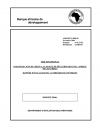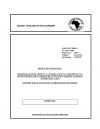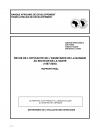
The East African Development Bank (EADB) is a sub-regional development bank owned by the three member states of Kenya, Uganda and Tanzania. Other shareholders include the African Development Bank, bilateral donors and some foreign banks. EADB was established in 1967 under the Treaty of East African Cooperation. Following the Cooperation’s break up in 1977, EADB was re-established in 1980 under its own charter and mandated to offer a broad range of financial services to small and medium enterprises (SMEs), guided by the overriding objective of promoting socio-economic development and regional integration in the member states.

The Eastern and Southern African Trade and Development Bank, commonly known as PTA Bank, was established in 1985 and mandated to facilitate the complementary development of the PTA member states, which was latter transformed into the Common Market for Eastern and Southern Africa (COMESA) member states. PTA Bank’s shareholders comprise 17 African states, one non-regional sovereign state and one institutional shareholder.1 PTA Bank is the largest sub-regional organization in Africa covering virtually all countries in Eastern and Southern Africa. Its objective is to provide project and trade finance to the private sector in the sub-region.

This Review of Bank Assistance to the Health Sector (1987-2005) is part of the OPEV Work Programme 2005-2006 as approved by the Board. It is the first comprehensive sector level review undertaken by OPEV, to be followed by several others including Agriculture and Rural Development, Education, Regional Integration, and Gender, as planned in the Three-Year Rolling Work Programme 2006-08. The review aims to assess the effectiveness of Bank assistance in the health sector in order to draw lessons and make recommendations to management of the Bank in its endeavour to substantially improve its health policy, strategies and interventions to better address the health challenges in Africa.

This Action Plan on improving OPEV evaluation feedback and dissemination in the short- to medium-run (2006-2008) is intended as a first step in the preparation of a more comprehensive OPEV Evaluation Feedback and Knowledge Management Strategy. Such a strategy should be closely informed by and aligned with the Bank’s overall planned new Knowledge Management and Communications Strategy, which is under development and expected to be completed by mid-2007

The cooperation between the Bank and Morocco goes as far back as 1970 but this evaluation focuses on the assistance provided by the Bank during the 1996-2005 period.

This Report evaluates the Bank Group assistance to the Republic of Tanzania. The Country Assistance Evaluation (CAE) provides relevant lessons to the Operations Complex by identifying good practices and shortcomings from past operations.